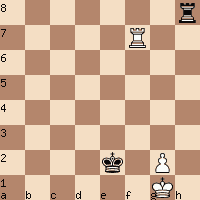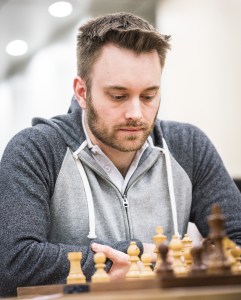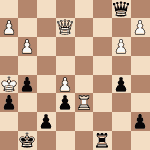Want to win a three-month PRO membership to Chessable or a one-year SparkChess Premium Live membership? In the comments to this article, ask International Master John Bartholomew a question. I (Alexey Root) asked John three questions. Read on to see my questions and John’s answers. However, you probably have more questions to ask John, a chess celebrity. On April 22, I will select the five best questions from the comments. Those “five best” will each win a one-year Premium Live membership to SparkChess. Then John will choose the very best question from my top five. The person who asked that “best question” will receive both a one-year Premium Live membership to SparkChess and a three-month PRO membership to Chessable. John will answer all five questions in my next article for Spark Chess. Read on to win (and to learn the Lucena position).
In my second article for SparkChess, I taught the Philidor’s position, a famous king, rook, and pawn versus king and rook position which the defending side can draw. Either right before or right after you learn the Philidor’s position, learn the Lucena position. The Lucena position is a famous king, rook, and pawn versus king and rook position, which the stronger side can win. Another topic of my first and second articles for Spark Chess was college chess. This third article for Spark Chess covers both the Lucena position and college chess.
The Lucena position features a pawn on the b-g files, about to promote but with the promotion square occupied by its own king. Here is one typical Lucena position:

The best video about how to win the Lucena position is from a former college chess player, International Master John Bartholomew. John took both of my online courses when he was a chess team member at UT Dallas. I interviewed John via email for this article.
Alexey asks: Wikipedia states that, according to John Emms, rook endings “occur in about 10 percent of all games (including ones that do not reach an endgame).” Should SparkChess readers believe that statistic?
Rook endings occur in about 10% of all games

John answers: The 10% statistic is often quoted, and it turns out to be roughly accurate. In the introduction to 100 Endgames You Must Know, author GM Jesus de la Villa presents an analysis of hundreds of thousands of games and determines that 8% of them reach a single-rook ending. Double-rook endings bump that percentage even higher.
I’ve always felt you can judge a player’s endgame skill and even overall ability by the manner in which they handle rook endings. If you’re a serious player you should definitely study these endings rigorously. One excellent introductory book to rook endings is Amateur to IM by Jonathan Hawkins. Hawkins provides a concise and engaging analysis of theoretical rook endings as well as general rook ending concepts. After that, I would move to 100 Endgames You Must Know and eventually tackle the most highly-regarded book on endgames, Dvoretsky’s Endgame Manual. I also have a free, brief tutorial on R+P vs. R endings on Chessable with accompanying videos.
Alexey asks: Speaking of statistics, you have 3,773 followers on Twitch TV, 6,843 followers on Twitter, and 12,144,559 views on YouTube. What are the good parts and bad parts about having such a large social media presence?
I’m grateful for all of the doors chess has opened up in my life
John answers: Having a large social media presence and being a “chess celebrity” definitely helps me business-wise. Once my chess YouTube videos began to receive many views, I quickly received an influx of requests for private coaching and was subsequently able to raise my hourly rate. I also owe my co-founding and participation in Chessable to my YouTube presence. My co-founder, David Kramaley, reached out to me in late 2015 about launching the site after seeing many of my videos and enjoying my educational approach.
Another cool area where I’ve been able to leverage my social media presence is organizing free, well-attended chess meetups in places like Boston, London, and Oslo. The very first meetup I organized was in Harvard Square in Boston in May 2017, and with only a couple of days promotion on my YouTube channel 40-50 players showed up to play blitz and hang out! It was great fun. I’m grateful for all of the doors chess has opened up in my life, and I always aim to give back to the chess community.
There honestly aren’t many downsides, but I’d say the biggest one is that more of my competitors in over-the-board tournaments know my style and the openings I play. One of my opponents in a GM-norm tournament last summer even told me that he watched several of my videos in preparation for a specific line of the Sicilian he prepared for our encounter in the tournament (we played to a draw)! In serious play, opening preparation and the element of surprise are critical factors. I definitely give up an edge by putting myself out there constantly in my videos. I consider it an acceptable trade-off, however.
Alexey asks: How did your college experiences help you to start Chessable and to be a professional chess player and teacher?
The experiences I had on the chess team, the friendships I forged, and the education I obtained were all important factors in working up the courage to pursue chess professionally
John answers: My college experience at The University of Texas at Dallas not only shaped my career path, but it also provided me with a great deal of life experience and important connections in the chess world. Earning a degree in Business Administration has proven useful in coaching, YouTube, Twitch, Chessable and much more, although if I could do college over again I think I would have chosen a finance or accounting major 😉
My brief experience in law school was also formative. I attended the University of Denver for a semester in 2010, but I quickly decided that a legal career was not for me. Without overthinking it, I dropped out, moved to New York City, and started teaching chess full-time. It was a gamble, but chess was my passion, and I wanted to give it a go. Fortunately, things worked out really well!
I’m glad I chose a traditional higher-education path, however. My college experience was fantastic, and the experiences I had on the chess team, the friendships I forged, and the education I obtained were all important factors in working up the courage to pursue chess professionally.
Now it is your turn to ask John a question. Put your question (or questions) in the comments below. Be sure to list your “real” email address (it won’t show in the comments) so that if your question is chosen as a “best question” you can win the membership prizes. Five one-year Premium Live memberships to SparkChess and one three-month PRO membership to Chessable will be awarded to the five best questions asked.
UPDATE: The competition has ended. Here are the winners.

while performing tennison’s gambit , if opponent plays this move,then what to do next????
1. e2-e4 d7-d5
2. Ng1-f3 d5xe4
3. Nf3-g5 Qd8-d5
Master: How can i put more attention to the board?.
At what point would you recommend newer players to start focusing on opening study? It’s hammered repeatedly that most newer players, once the grasp of the game is there, to grind tactics and end game to oblivion. When should someone start learning other openings, how and what type of repertoires would you recommend as people grow in chess?
With the growing popularity of chess on line, has John ever considered combining forces with other popular streamers (chessbrahs, gingergm, penguinn, etc) to create a network for a more centralized place for folks to connect and follow along and show support (financial or otherwise)?
Do you have a ‘hipster favourite’ game? I mean a game you really like but it’s not really well known.
You’ve mentioned before that you sometimes bring a chess board to a coffee shop to study opening lines and stuff.
What is your coffee of choice while doing this?
With regards to openings, how many specific moves do you think you have committed to memory?
Hey John! With your work as a chess coach, have you noticed any tendencies for which strategic elements club level players tend to struggle with? For example color complexes or space, ect. Or is that something that varies player to player?
Is there a general plan to deal with getting a knight pinned in the opening? I sometimes play my knights to squares I suspect are suboptimal (namely d2 and e2) simply to avoid the possibility of a pin, but would much rather know how to deal with the pin should it arise.
Hey John.
Would you prefer it if chess engines had never been invented?
Do you think people who only play internet chess can call themselves “chess players”, or do you think that you need to play “over the board” and actually look your opponent in the eye, shake their hand etc before they’re truly “chess players”?
On your channel you haven’t played the modern against d4 with an early Nc6 in years, so will you publish it as an opening book on chessable?
What thoughts do you take to come up with the best move at any given time of the game?
For players between 1200-1600, how would you suggest reviewing your games? Any specific tools you’d advise to use when reviewing?
Have you ever heard of the 16 personality types? If so which one are you and if not please take the test and let your fans know.
btw I expect you to be an INTJ.
http://www.16personalities.com/free-personality-test
John . How much emphasis do you place on ensuring you are not mentally fatigued or unwell before playing a serious game? Thank you.
Hi John, I would like to donate money to a chess themed charity. In your opinion, what organization would make the most out of the contribution?
Over three online chess sites I play to an ELO of around 1400 using basic knowledge of the Colle and London systems.
Which one should I get to know deeper to improve my ELO?
What are some general guidelines with respect to tension of center pawns? When to push, when to take, when to wait/keep the tension for future tactics? Thank you for your consideration and your promtion of chess for club level players.
How do you mentally prepare yourself before you start a game or is there any rituals you do before playing? How do you deal with loses?
Hi John! I’ve been a channel viewer and casual chess player for over a year now. Your videos have been really informative and one of the biggest causes of my improvement since I started playing.
My question to you is about chess coaching. Do you have any strategies that you use to facilitate learning or keep students engaged that can also be applied to all forms of education? Additionally, do you think coaching other chess players has made you stronger at the game? If so, how?
I am interested in your responses because I believe strongly in the power of education and may want to pursue it as a career, although it still may be a bit early to make that determination. I also tutor younger students in math to get a bit of money, and I’m always looking for ways to get better at it.
Keep up the awesome work! Thanks John!
You lost a match with computer, whats is computer best player ?
According to you, is there any connection between chess and real life? If yes, how?
For your first game what were you thinking and what were you feeling
Hi John! If you could choose one player from the annals of chess history to have a game with, who would it be and why?
Hello Alexey and John,
I’ve been playing with a very competitive friend for about a year and it has been fun but our progress has diminished greatly after we both hit around 1500 online. Both of us are 25 years old. Our question to John, is there anything we could do to take advantage of two minds?
We are aware of the principles of studying chess but cannot come up with anything else than having another pair of eyes replaying our games.
Thank you for your time!
When is the best time to file a pawn with an unranked opponent in rank territory vs a ranked pawn unwanted.
CHESS QUESTION:
A “natural” player (such as J.R. Capablanca) conceptually grasped positional “truth” by the age of 4.
What one human can achieve, another can as well.
______
Where/How is THIS intuitive ability taught or learned?
______
Watching chess as it is played–in REAL time–(not Blitz, for God’s sakes) could a person of natural talent (a Capablance–who watched his father play) not feel the frisson of awakening intuition?
Didn’t Alpha Zero “teach itself” by–in effect–“watching”–itself play against itself?
Does this not further imply a new way of looking at intuition?
Raw Talent may only be the capacity to extrapolate “meaning”, form and structure out of a set of formal procedures. No?
In Chess, there exists a non-chaotic balance of forces.
White disturbs the balance and Black can seek to either restore or exploit the imbalance.
How this is achieved has given us the entire historical repetoire.
But how can we BEGIN our chess career plugging into “intuition” rather than formality and Theory. (Are you listening, Nimzovich?)
Hi John, long time fan and subscriber! Thanks to you my rating has gone from begginer to 1850 ish within 2 years. My question to you is…. Bobby Fischer wowed the world by playing chess in a way no one had seen before, with the introduction of computers these last few years do you think we will ever see a human player create new styles and ways of playing or are we now purely students of the computers? The stockfish Vs alpha zero games taught us some surprising things, will we see variations named after the computer programming rather than us humans in future? Keep up the great work you are a great ambassador for chess ?
Chess is mind game and requires lot of strategy …how can one train his mind to think in a logical and strategic manner
Chess is a really fun game that involves critical thinking skills and planning ahead. In my 8th grade year my science teacher had us play a chess tournament with our classmates and then the one who from our class would play again other class winners. I really enjoyed this part of my 8th grade year, my question is John would you recommend teaching Junior High students how to play chess. If so what are your reasons?
if i have a 3 pawns and castle and my friend has 1 pawn and knight it is better to take knight with castle to win or no?
Many teachers say one should start working on endgames. There are very good endgame books (Jeremy Silman’s complete course, Ruben Fine’s Endings) are there any books on the middlegame that stand about the rest? Or is that just a lots of tactics work?
What is the best thing about Chess?
Hi John, I have two questions:
1 What do you recommend to an ex player trying to come back to chess after 50 years. I was a strong player with ELO 2000 app, I left chess because of my career.
2 Do you think is possible to develop a change in the rules trying to difficult the performance of artificial intelligence in favour of human creativity?
Best regards, Thank you very much
Why is playing chess important?
How are you such a good chess player:)
Why it is not possible to checkmate a game with only two knights??
any idea of the measurement or indicator of the impact of this game in the initiation of children to chess. ?
Can you beat GM Hikaru Nakamura?
Could you explain why men are more successful chess players than women? Is it due to biological or social reasons?
Hi John,
I am an older, novice chess player (<1000) and thinking about hiring a chess coach to improve my play. would you recommend investing in a coach for someone at my level? and if so, what are some of the important qualities i should look for?
thanks and looking forward to more videos in your chess fundamentals series on your youtube channel!
when you play do you ever do dangerous moves where the pieces could be captured, or do you keep it safe?
Hi John. What percentage of games that have a pawn reach the 8th rank are under promoted? Thank you
In order to improve do you recommend playing opponents of similar ability or greater ability.
What was your favorite win, John?
Since Alpha zero is an AI and Leela zero is a neural network based on human learning and make human like moves . So can we study their playing methodology and adopt it to improve our chess capabilities.
Tell us about your very First Chess Game?